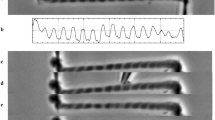Abstract
THE so-called latent period, which includes latency relaxation, has an important bearing on theories of excitation coupling. It is surprising then that systematic studies1,2 of this phenomenon do not mention the role of the stimulus. The reason is that, with the frog sartorius, increasing strength of stimulus above twice the threshold value apparently produces no significant effect on the latency, while below this value the effects may conceivably be dismissed as due to ‘recruitment of fibres’. Even here, however, latency relaxation increases and may reach as much as 1 per cent of tetanus tension at ten times threshold field-strength.
This is a preview of subscription content, access via your institution
Access options
Subscribe to this journal
Receive 51 print issues and online access
$199.00 per year
only $3.90 per issue
Buy this article
- Purchase on Springer Link
- Instant access to full article PDF
Prices may be subject to local taxes which are calculated during checkout
Similar content being viewed by others
References
Sandow, A., Ann. N.Y. Acad. Sci., 47, 895 (1947).
Abbott, B. C., and Ritchie, J. M., J. Physiol., 113, 333 (1951).
Brown, D. E. S., and Sichel, F., J. Cell. Comp. Physiol., 8, 315 (1936).
Hill, A. V., Proc. Roy. Soc., B, 136, 405 (1949).
Author information
Authors and Affiliations
Rights and permissions
About this article
Cite this article
GOODALL, M. Dependence of Latent Period in Muscle on Strength of Stimulus. Nature 182, 1736–1737 (1958). https://doi.org/10.1038/1821736a0
Issue Date:
DOI: https://doi.org/10.1038/1821736a0
This article is cited by
-
Acoustic phenomena in the latent period of skeletal muscle: a simple method for in-vivo measurement of the electro-mechanic latency (EML)
Pfl�gers Archiv European Journal of Physiology (1985)
Comments
By submitting a comment you agree to abide by our Terms and Community Guidelines. If you find something abusive or that does not comply with our terms or guidelines please flag it as inappropriate.



